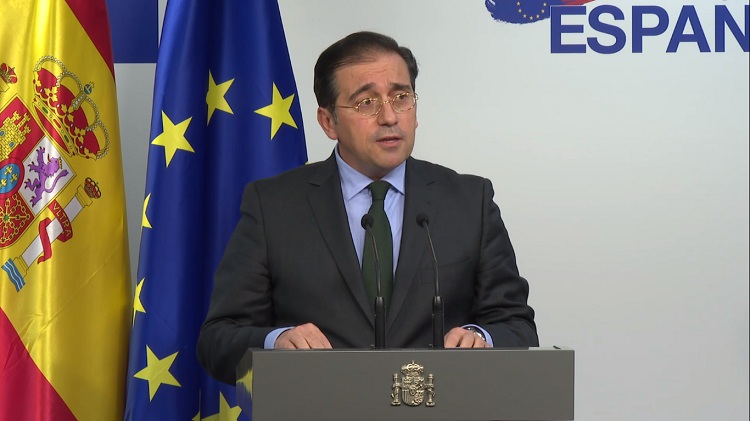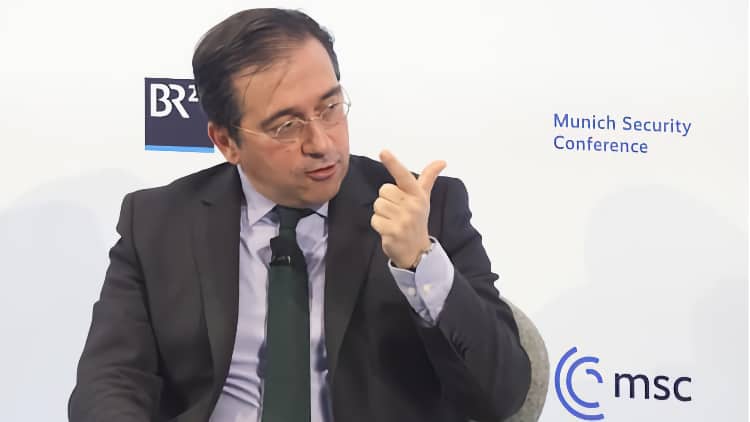The Diplomat
The Minister of Foreign Affairs, José Manuel Albares, will address today in Brussels with his EU counterparts some of the major issues of international current affairs, such as the crisis in Ukraine and its implications for European security and the situation in Mali.
The Foreign Affairs Council, which will be chaired by the EU High Representative for Foreign Affairs and Security Policy, Josep Borrell, will discuss the latest developments on the Russian military deployment around Ukraine and hold a debate on the European security situation. In addition, the EU foreign ministers will hold an informal breakfast exchange with Ukrainian Foreign Minister Dmytro Kuleba.
The meeting comes four days after an informal European Council on the situation in Russia and Ukraine was held in Brussels, during which European Council President Charles Michel advocated “all possible diplomatic formats to de-escalate” the situation and Josep Borrell announced his intention to prepare a “comprehensive and very tough” package of sanctions against Russia. “If there is any aggression, I will immediately convene the Foreign Affairs Council to propose the package of sanctions and I am sure that, even if unanimity is required, the Council will approve them,” he added.
At the end of the same meeting, the President of the Government, Pedro Sánchez, stressed to the press the “absolute unanimity” shown both by “the European Union and the Member States” and within “the Transatlantic Alliance” in relation to “the response being given to Russia on this crisis”.
After the discussion on Ukraine, the ministers will address the fight against climate change and the promotion of climate action, and then discuss the current situation in Bosnia and Herzegovina, a country that “is facing one of the deepest political crises since the end of the armed conflict in 1995,” according to the EU Council. On October 18, the Council reaffirmed its commitment to the territorial integrity, sovereignty and unity of Bosnia and Herzegovina, while deeply regretting the protracted political crisis in the country and condemning the blockade of state institutions. For his part, Josep Borrell called on all Bosnian leaders to resume a “serious and fruitful dialogue” to ensure a “lasting and long-term resolution of the current political crisis in the country”.
On February 9, Pedro Sánchez held his first bilateral meeting at La Moncloa with the President of the Tripartite Presidency of Bosnia and Herzegovina, Željko Komšić, to whom he showed Spain’s support for the “territorial integrity” and stability of his country and defended the fourteen priorities set by the European Commission to initiate the process of accession to the EU, including electoral reform.
The foreign ministers will also take stock of the latest international developments, including the situation in Mali. Last Thursday, France made good on its threat to withdraw its troops in Mali in retaliation for the coup military junta’s decision to expel its ambassador in Bamako. To this end, French President Emmanuel Macron brought together on Wednesday evening in Paris the heads of state of the countries involved in the international missions Barkhane – for the fight against terrorism – and Takuba – made up of special units from different European countries – to discuss this decision.
Spain was not invited to this meeting in Paris because it is not part of these missions. On the other hand, Spain currently provides the largest contingent (500 military personnel, 24% of the total) of the European training mission EUTM Mali. Spain has repeatedly insisted that any decision on this mission must be taken by the EU as a whole and has warned that a hasty withdrawal from Mali could degenerate into “another Afghanistan”, in addition to leaving an empty space that could be occupied by other powers, such as China or Russia, in this case through the Russian mercenaries of the Wagner Group.







